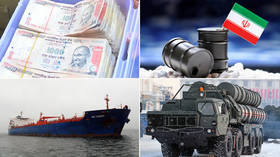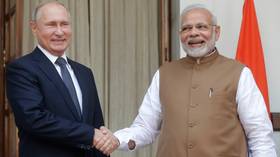4 ways India is putting its own interests before Washington's

India appears to be defying every foreign policy goal relentlessly pursued by the US, stubbornly striking deals with nations Washington is trying to isolate from global trade.
Russia, Iran and now Venezuela – all among the top targets of Washington's aggressive rhetoric and sanctions – are also among the nations India has been refusing to turn its back on. The country's growing economy needs energy and its military needs hardware, and it is not allowing lucrative deals slip away to appease the superpower on the other side of the world.
Venezuelan oil
The government in Venezuela, Washington's most recent regime-change effort, has been squeezed tight by American sanctions. A country mostly dependent on oil revenues, has been hit hard as US-bound shipments were cut off.
India appears to be jumping in to pick up the slack, though: it became world number one buyer of Venezuelan crude in the first half of February, with imports up 66 percent.
Also on rt.com US sanctions help India become No.1 buyer of Venezuelan crudeThat is despite a somewhat general but very clear threat issued by US National Security Advisor John Bolton, who tweeted last week that those dealing in Venezuelan oil would “not be forgotten.” The message did not name India, but included a link to an article about Venezuelan Oil Minister Manuel Quevedo's visit to India the previous day.
Nations and firms that support Maduro’s theft of Venezuelan resources will not be forgotten. The United States will continue to use all of its powers to preserve the Venezuelan people’s assets and we encourage all nations to work together to do the same. https://t.co/4MmHyjFY8K
— John Bolton (@AmbJohnBolton) February 12, 2019
Russian arms
India is also buying S-400 anti-air missiles from Russia, which the US has designated one of its top adversaries. Time and again, in the run-up to the signing of the deal, Indian authorities refused to back down from the $5.4 billion deal – and now that it's been sealed, New Delhi has become the potential target of sanctions under the Countering America's Adversaries Through Sanctions Act (CAATSA).
There have been reports that India was offered a waiver if it buys American F-16 fighter jets, but then again there have also been reports that it's eyeing Russian MiGs as well.
On top of that, India is also about to get four Russian frigates for its fleet.
Iranian oil
The US has granted India a sanctions waiver to buy oil from Iran (albeit at reduced volumes) – another country whose economy the Trump administration is seeking to choke out of oil revenues.
The six-month exemption is set to run out in May, and Washington has indicated it won't be renewed after that but Iran's deputy foreign minister for economic diplomacy has said he hopes India will keep importing. He also offered Indian companies a chance for development rights for an Iranian gas field, hinting at more favorable terms to sweeten the deal.
Ditching the dollar
Not only is New Delhi dealing with American adversaries, it is doing so without involving the US dollar.
Russian S-400s are being paid for in rubles as a result of American sanctions against Moscow, and after Washington reintroduced its penalties on Tehran, the oil purchases from Iran are being made with rupees. In December, India and the United Arab Emirates sealed a currency-swap agreement to boost trade and investment without the involvement of a third currency.
With India being the sixth-largest economy and the third-largest country by purchasing power parity, a continued shift to other currencies could considerably weaken the US dollar's role in global trading.
Also on rt.com Top 5 countries opting to ditch US dollar & the reasons behind their move‘Not a banana republic to be pushed around’
Securing an affordable stock of oil is important for India, particularly because 2019 is election year, Bharat Karnad, research professor at the Indian Centre for Police Research believes.
“The BJP government with votes to get does not also want a nasty oil surprise to contend with,” he told RT. Besides, buying oil from other sources “allows Delhi greater diplomatic freedom to deal with Saudi Arabia and the Gulf oil suppliers,” while “pacifying” Washington by buying $1.5 billion worth of American oil at the same time.
Sreeram Chaulia of India’s Jindal School of International Affairs says it's about more than just seeking the most cost-effective sources of energy and hardware. No less important is to show the US that India will look after its own interests above all, even if faced with pressure from a superpower.
The threat of American sanctions is “not the end of the world,” Chaulia told RT. “We can survive them.”
“We want our American partners to understand that we have our own interest and our own will, and we are not like some banana republic that can be pushed around… I think what Prime Minister Modi and our government is doing is we’re going to put India first,” he said.
“If China is buying from Venezuela, if South Korea and Japan are buying from Venezuela, why can’t we?”
If you like this story, share it with a friend!














